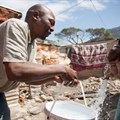The start of the new phase of the Climate and Development Knowledge Network (CDKN) was announced on Thursday, 21 June, by Henk Ovink, special envoy for international water affairs for the Kingdom of the Netherlands, and Pamela Moore, chargé d'affaires of the High Commission of Canada to South Africa.
In this new phase, CDKN will focus on providing developing countries with enhanced knowledge resources to support ambitious climate action, as well as boost climate leadership and learning on climate compatible development. CDKN’s global and Africa programme is now led from South Africa, with Latin America and Asia regional hubs managed from Ecuador and India. Canada’s International Development Research Centre (IDRC) and the Royal Netherlands Ministry of Foreign Affairs will fund CDKN’s new chapter to the value of $9.2m, and it will run from 2018-2021.
Interconnectedness of climate change
Speaking at the launch event in Cape Town, Ovink said, “The Dutch development policy for the first time focuses on the interconnectedness of climate change and root causes of poverty, political instability, conflict and migration. The knowledge and experience of CDKN to support complex policy realities, to work in partnership with governmental and non-governmental stakeholders, and to connect human development ambitions and environmental sustainability is a very valuable asset in this strategy.”
Said Moore, “Climate change is a shared global challenge and Canada is committed to working together with partners around the world on climate action. Canada is pleased that a refreshed Climate and Development Knowledge Network is being launched. We are excited to be part of this global partnership for large-scale change that enables vulnerable communities to adapt to climate change, mitigate its impacts, and transition to a low-carbon economy.”
CDKN will work to enrich decision-makers’ know-how and help them to accelerate climate action. Dr Shehnaaz Moosa, the new CDKN director, said: “Climate-vulnerable countries are eager to access and apply knowledge about ‘what works’ in climate-compatible development; the challenge is how to navigate the great amount of climate-related information and analysis to find what is most useful, and adapt and tailor it for their countries’ needs. That is exactly the challenge that CDKN’s new initiative aims to address.”
Knowledge for implementation
CDKN will be expanding its knowledge-sharing services. It will tailor the wealth of evidence and learning from the first eight years of CDKN and other international climate programmes to produce highly targeted knowledge and tools to support policy design and implementation. This could include best practices for building climate-resilient water infrastructure or approaches for integrating climate information into agricultural planning.
Facilitating climate leadership and learning
CDKN will continue to bring developing countries together to share their experiences on delivering climate action on the ground. It will facilitate South-South learning, helping to connect professionals who face similar climate and development challenges. Through targeted training on climate and development as well as mentoring and skill-building, CDKN aims to strengthen the capability of individuals in government, business, academia and other spheres to navigate the growing body of climate knowledge and experience, and further cultivate a new generation of climate champions.
"While the effects of climate change are increasingly evident in developing countries, the knowledge that is generated by these countries to adapt to change is becoming more relevant by the day. Therefore, we are happy to support CDKN's work to mobilise Southern knowledge and capacities to overcome climate-related development challenges", said Robert Hofstede, associate director for Climate Change at IDRC.
The initiative will focus initially on the Andean countries of Latin America, parts of Africa and South Asia – with the possibility for collaboration with other countries to join its wider learning and exchange activities. From 2018, CDKN is managed by a new alliance led by non-profit organisation SouthSouthNorth, working with Fundación Futuro Latinoamericano, ICLEI - Local Governments for Sustainability, South Asia, and the Overseas Development Institute (ODI).



































